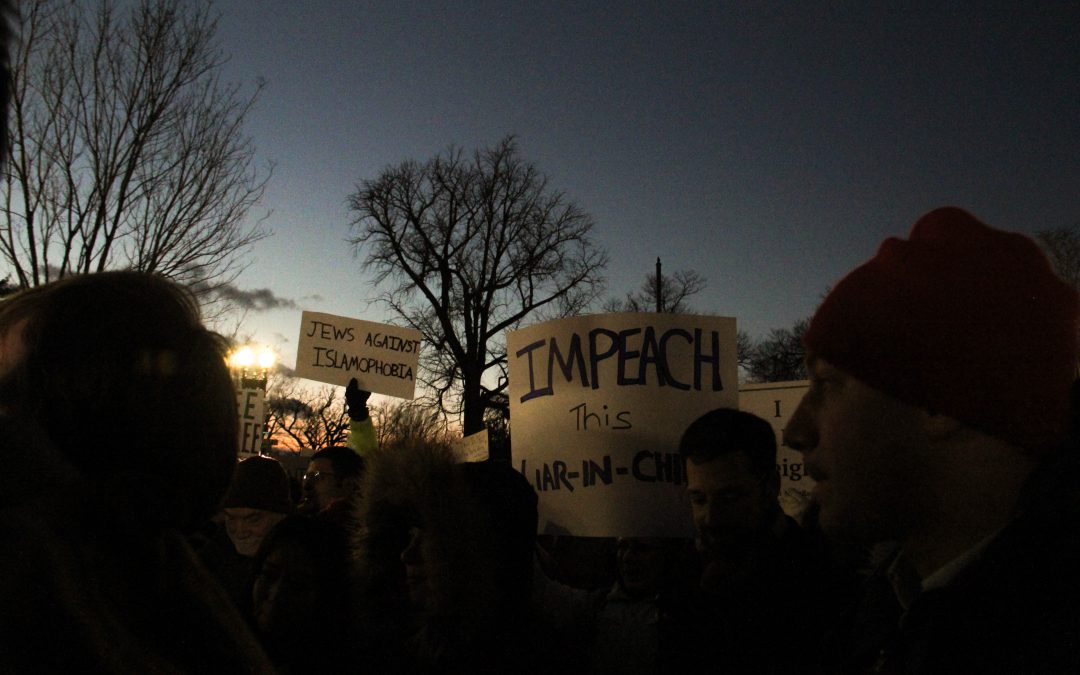WASHINGTON – As Senate and House leaders Monday called for legislation to overturn the Trump administration’s ban on travel to the U.S. by people from certain Muslim countries, Shahrouz Hafez was thinking about how the ban has changed his future from a job in America to a home in Canada.
“Because of the situation here, I resigned from my (internship) position at the World Bank,” the Iranian-born student said. “I can’t contribute to the economy here and receive benefits because of what the government is doing to innocent people. These are personal consequences for us, but we have to do something, however small.”
Hafez, who goes to law school in Toronto, was among several hundred demonstrators and congressional Democrats condemning President Donald Trump’s executive order on immigration Monday night outside the Supreme Court.
“It’s not just a religious ban,” Hafez said. “It’s an ethnic ban. They’re banning people based on race.”
Senate and House leaders promised legislation to overturn Trump’s order, which suspended entry into the United States by refugees for 120 days and by citizens from seven Muslim-majority countries (Iraq, Iraq, Libya, Somalia, Sudan, Syria and Yemen) for 90 days. The ban includes green card holders, and Syrian refugees are barred indefinitely.
Senate Democratic Leader Chuck Schumer and Sen. Bernie Sanders, the former Democratic presidential contender, said at the press conference the ban will make Americans less safe.
“It will encourage those who are lone wolves as they get more and more isolated, which is our greatest danger,” Schumer said.
“What Trump has done is give ammunition to the jihadists all over the world,” Sanders said.
The Trump administration and many congressional Republicans have said the order was issued to ensure necessary background checks for national security and public safety purposes.
The resettlement process in the United States takes between 18 and 24 months and involved eight federal agencies, according to the UN refugee agency. Refugees cannot apply for resettlement, nor can they pick their host country.
Since the Refugee Act of 1980, in which rigorous refugee-screening procedures were established, no refugees have been involved in a major deadly terrorist attack in the United States, according to a Cato Institute analysis.
Rep. Jeff Duncan, R-S.C. issued a statement saying the executive order was not a “Muslim ban” and pointed out that Indonesia, which has the largest Muslim population, was not on the list.
“There are 46 other countries with Muslim populations that are not part of this and I think that’s an important thing to note,” White House press secretary Sean Spicer said Sunday on ABC’s This Week.
But the congressional Democrats at the Supreme Court protest denounced the order as an attack on religious freedom.
“America for its history has been a shining beacon and it has said, we welcome you if you are oppressed because of your religion, because of your political beliefs, because of who you are,” Schumer said. “We will not let this evil order make us less American. We will fight it with everything we have and we will win this fight.”
Sen. Elizabeth Warren, D-Mass., tweeted that the order is Trump’s “illegal and unconstitutional ban.”
Jared Mitchell, who said he moved to Washington a month ago in reaction to the arrival of the Trump administration, said that “[Muslim] people have been treated as criminals for being who they are. I identify with that as a black man.”


